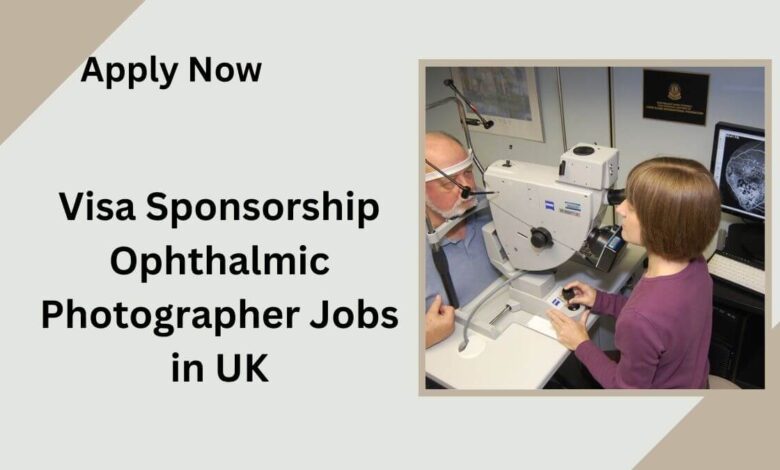Visa Sponsorship Ophthalmic Photographer Jobs in UK 2025

Effective and efficient maintenance of a comprehensive ophthalmic imaging service for the Directorate of Ophthalmology will be the responsibility of the incumbent of the position. The incumbent will provide a comprehensive range of photographic, videographic, and technical services to a variety of ophthalmic clinics in order to facilitate diagnosis and education, serving as a clinical/ophthalmic photographer.
Check Also: Ophthalmic Technician Jobs in UK – Visa Sponsorship
Key Points:
- Job Type: Full Time
- Location: Doncaster, United Kingdom
- Salary: 28,407 – 34,581 £ / Year
- Company: Doncaster and Bassetlaw Teaching Hospitals NHS Foundation Trust
Duties of Ophthalmic Photographer Jobs in UK:
Support personnel, healthcare professionals, general practitioners, and clinicians are anticipated to engage in communication with the successful candidate.
The individual in this position will be required to perform photographic and video procedures of varying degrees of complexity, some of which require a high level of skilland experience. Furthermore, you will be required to exercise autonomy within professional and managerial boundaries and verify and validate completed work.
About us
DBTH is a prominent acute trust in Yorkshire, offering treatment to a population that exceeds 440,000. Our services are rendered by more than 7,000 associates, who are employed at three primary hospital sites and numerous supplementary services.
Our goal is to equip Team DBTH members with the resources and opportunities that are essential for them to progress in their endeavors. We are dedicated to supporting your accomplishment, belonging, and development.
We are dedicated to ensuring that you are able to work in a way that is beneficial for us, our patients, and you, as we are an organization that advocates for flexible working arrangements. Please reach out to us to explore the potential for implementing a flexible work schedule. We will make every effort to ensure that the service is functioning correctly for you if it is.
We are an equal opportunity employer and encourage applications from all sectors of the community, with a particular focus on underrepresented groups, including members of our ethnic minorities, LGBTQ+ communities, and individuals with disabilities.
Benefits of Ophthalmic Photographer Jobs:
- Contribution to Healthcare: Ophthalmic photographers play a vital role in diagnosing and managing a wide range of eye conditions and diseases. By capturing highly detailed and accurate images of the eye, they support ophthalmologists and other healthcare professionals in developing treatment plans and making precise diagnoses.
- Professional Development: This career offers continuous opportunities for learning and growth. Ophthalmic photographers often receive specialized training in medical terminology, imaging techniques, and ophthalmic procedures—enhancing both their expertise and professional value.
- Diverse Work Environments: Ophthalmic photographers work in varied settings, including hospitals, private practices, clinics, and research institutions. These environments provide opportunities to collaborate with a broad spectrum of healthcare professionals, use advanced imaging technologies, and gain exposure to numerous eye conditions and treatments.
- Job Security: With aging populations and ongoing advancements in eye care, the demand for skilled ophthalmic photographers remains strong. This growing need offers long-term job stability and security in a fulfilling healthcare career.
- Impact on Patients: Visual documentation through ophthalmic photography is essential for monitoring disease progression and evaluating treatment effectiveness. Professionals in this field take pride in contributing to the preservation and improvement of vision—directly enhancing patients’ quality of life.
- Technological Advancements: Ophthalmic photographers work with state-of-the-art equipment such as optical coherence tomography (OCT), fundus cameras, and fluorescein angiography systems. Staying current with these innovations not only keeps the role intellectually stimulating but also opens doors to areas of specialization.
- Career Advancement: There are numerous pathways for progression within the field. Ophthalmic photographers may choose to become certified ophthalmic medical technologists (COMTs), specialize in niche areas like retinal imaging or corneal topography, or move into supervisory and leadership positions.
- A Highly Rewarding Career: Beyond the technical skills and clinical responsibilities, many ophthalmic photographers find deep fulfillment in their work. Building meaningful relationships with patients and witnessing the life-changing effects of improved vision makes this profession uniquely rewarding.
Experience
Essential
- Working in a fast-paced environment Work experience in a healthcare or service capacity
- Proven capacity to work effectively with a limited team Expertise in information technology
Desirable
- Experience in a patient-centered environment, such as a medical facility or ophthalmic office
- Experience in a photography or imaging environment
- Experience with ophthalmic imaging equipment
- An interest in photography
Qualifications
Essential
A diploma or degree-level qualification or equivalent work experience in a relevant scientific, art, or photography-based environment
Desirable
A certificate in ophthalmic photography or an equivalent qualification in a relevant science or photography field
Personal Attributes & Skills
Essential
- Demonstrate proficient written and verbal communication abilities with patients and within the team.
- Manifest a receptive demeanor while demonstrating a compassionate demeanor.
- Capacity to organize one’s own responsibilities A willingness to provide guidance and support to other team members
- An exceptional quality of written communication skills
- Demonstrates a flexible approach to meet the requirements of the ophthalmic service.
- The ability to anticipate and be prepared in order to optimize the service’s operation
Desirable
- Proven ability to effectively manage conflicting and public situations
- Understanding of confidentiality
- Understanding of the concepts of privacy and dignity
- Exhibited leadership capabilities
Disclosure and Barring Service Check
The Rehabilitation of Offenders Act (Exceptions Order) of 1975 applies to this position. As a result, it will be necessary to submit a disclosure application to the Disclosure and Barring Service (formerly known as the CRB) in order to confirm any prior criminal convictions.
Certificate of Sponsorship
All other applications, including those from job applicants who require current skilled worker sponsorship to work in the UK, will be taken into account. For further information, please visit the UK Visas and Immigration website (opens in a new tab).
Skilled worker applicants who are seeking entry clearance into the United Kingdom have been obligated to submit a criminal record certificate from each country in which they have resided continuously or cumulatively for 12 months or more in the past decade, effective April 6, 2017. This requirement also pertains to adult dependents who are over the age of 18. This location provides guidance. Criminal background checks for international applicants (opens in a new window).
Frequently Asked Questions:
How much do ophthalmic photographers make in the UK?
The national average salary for an ophthalmic photographer is £30,812 in the United Kingdom.
How do I become an ophthalmic photographer in the UK?
The Ophthalmic Photographers’ Society offers two certifications: the Certified Retinal Angiographer (CRA) and the Optical Coherence Tomographer Certified (OCT-C). Not only do certifications make your name fancier, but they also declare that you have a basic level of skill.
Is there a shortage of ophthalmologists in the UK?
The ophthalmology staff shortages are affecting patients across the UK, with over 632,000 people with different eye conditions on the waiting lists in England alone, 24,000 of whom are waiting for over a year.



